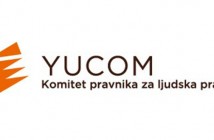What is to be concluded from the recent verdicts of the ICTY?
December 24, 2012
For a couple of days following the acquittals of Croatian Generals Gotovina and Markač and Kosovar KLA units’ leader Haradinaj, various reactions caused turmoil in the region – torrents of bitter statements from the Serbian side and euphoric outbursts in Croatia and Kosovo, respectively. As fierce as the reactions were, officials and the media in the counties in question quickly lost interest. It seems as though nothing was learned. Nothing about the necessity for reconciliation in the region by assuming responsibility for one’s own actions. Nothing about the recognition of victims- although one’s own victims are always in the forefront. Nothing about the respect for the institution of an international court which, all the flaws regarding individual decisions notwithstanding, aims to replace violence with law and legal processing of the use of violence. Nothing about Serbia‘s insufficient support in regard to the gathering of evidence for the indictments – the Court is a priori dismissed and because the Serbian side finds it difficult to imagine anything else, there was talk of a “bought” verdict. At the same time, no word has been uttered about the consequences of the Croatian generals’ acquittals in the context of international criminal law. Rather than that, the Serbian War Crimes Prosecutor announced that it would bring indictments against the culprits in Serbia.
The Heinrich Böll Foundation does not wish to accept these multiple “nothings”, so we asked an independent journalist to conduct a series of interviews in order to elaborate on the consequences of such decisions by The Hague. The interviewees included persons from the (Serbian, Kosovar and Croatian) civic society who have spent years dealing with facing the past from a legal standpoint and who support the work of the ICTY while advocating regional reconciliation, based on historical facts established in the course of the court investigations.
Interviews
1) Sonja Biserko (Helsinki Committee for Human Rights in Serbia)
2) Nataša Kandić (Humanitarian Law Center, Serbia)
3) Vesna Rakić-Vodinelić (Professor at the Union University Law School)
4) Staša Zajović (Women in Black)
5) Milan Antonijević (YUCOM – Lawyers‘ Committee for Human Rights)
6) Drago Kovačević (Mayor of Knin before the “Storm” military operation; Coordinator with the Serbian Democratic Forum )
7) Vesna Teršelić (Documenta, Zagreb)
8) Bekim Blakaj (Humanitarian Law Center, Priština)
Additional links:
Mirko Attila Hoare, Vindication or travesty ? Operation Storm’s Ante Gotovina and Mladen Markac acquitted
Marko Milanović, The Gotovina Omnishambles
Dubravka Stojanović, Why don’t I feel good after the verdict of the Hague Tribunal?
Florian Bieber, Hague Verdicts Don’t ‘Justify’ Croatia’s, Kosovo’s, Wars



